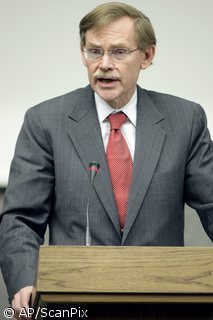Jan Rokita, tipped to become Poland’s prime minister after 2005 elections, wants swift public finance reforms including a weaker role for the finance minister in creating annual budgets
Published:
31 January 2005 y., Monday
Jan Rokita, tipped to become Poland’s prime minister after 2005 elections, wants swift public finance reforms including a weaker role for the finance minister in creating annual budgets, a newspaper reported on Saturday.
Opinion polls show Rokita’s centre-right Civic Platform (PO) and a right-wing ally winning general elections due either at mid-year or around September.
"Firstly, I want to remove budget preparation from the purview of the finance ministry and transfer it to the prime minister," Rokita told the daily Rzeczpospolita.
Such a change would shift to the prime minister the task of enforcing budget discipline within the government — a role traditionally held by the finance minister in Poland.
Along with government cutbacks, the PO hopes its flat-tax reforms would help reduce Poland’s budget deficit from about five per cent of GDP in 2004 to below the euro’s three per cent ceiling by 2007 — enabling single currency adoption in 2009-2010.
Rokita said he wanted to carve out a new development ministry from several current ministries to oversee regional development and the use of funds available from the European Union, which Poland joined last May.
He would also seek to reduce employment in the public sector by about 20 per cent, mostly at the regional administration level.
Šaltinis:
warsawdaily.com
Copying, publishing, announcing any information from the News.lt portal without written permission of News.lt editorial office is prohibited.
The most popular articles
 An International Monetary Fund (IMF) mission led by Mr. Hunter Monroe of the IMF’s Western Hemisphere Department visited Dominica during January 18-28 for the annual Article IV discussions on economic developments and macroeconomic policies.
more »
An International Monetary Fund (IMF) mission led by Mr. Hunter Monroe of the IMF’s Western Hemisphere Department visited Dominica during January 18-28 for the annual Article IV discussions on economic developments and macroeconomic policies.
more »
 Experts in agriculture and government authorities coincided in requesting new management mechanisms and market regulation to protect the farming sector from the price crisis and enable generational changeover in rural areas at the European Congress of Young Farmers, organised by the ASAJA-Seville agricultural organisation.
more »
Experts in agriculture and government authorities coincided in requesting new management mechanisms and market regulation to protect the farming sector from the price crisis and enable generational changeover in rural areas at the European Congress of Young Farmers, organised by the ASAJA-Seville agricultural organisation.
more »
 Immediate action is required to solve Europe's skills deficiencies and give Europeans a better chance of labour market success in the future, says an independent expert report published by the European Commission today.
more »
Immediate action is required to solve Europe's skills deficiencies and give Europeans a better chance of labour market success in the future, says an independent expert report published by the European Commission today.
more »
 The European Investment Bank (EIB) is lending EUR 15.5 million to upgrade water supply and wastewater treatment in the City of Mykolayiv (southern Ukraine) and EUR 100 million to finance small and medium-sized investments in the areas of SMEs, energy efficiency and the environment in Ukraine.
more »
The European Investment Bank (EIB) is lending EUR 15.5 million to upgrade water supply and wastewater treatment in the City of Mykolayiv (southern Ukraine) and EUR 100 million to finance small and medium-sized investments in the areas of SMEs, energy efficiency and the environment in Ukraine.
more »
 The European Commission can confirm that on 20 January 2010 Commission officials carried out targeted inspections at the premises of producers of Flexible Alternating Current Transmission Systems (FACTS).
more »
The European Commission can confirm that on 20 January 2010 Commission officials carried out targeted inspections at the premises of producers of Flexible Alternating Current Transmission Systems (FACTS).
more »
 The European Commission has authorised today under the State aid rules a Lithuanian scheme worth LTL 10 million (approximately EUR 2.9 million) aimed at supporting farmers who encounter difficulties as a result of the current economic crisis.
more »
The European Commission has authorised today under the State aid rules a Lithuanian scheme worth LTL 10 million (approximately EUR 2.9 million) aimed at supporting farmers who encounter difficulties as a result of the current economic crisis.
more »
 The effects of the global food, fuel and economic crisis would be felt by Africa’s people for some time yet and it was important to persist with efforts to protect the most vulnerable while laying the foundations for future productivity and growth, World Bank Group President Robert B. Zoellick said Tuesday.
more »
The effects of the global food, fuel and economic crisis would be felt by Africa’s people for some time yet and it was important to persist with efforts to protect the most vulnerable while laying the foundations for future productivity and growth, World Bank Group President Robert B. Zoellick said Tuesday.
more »
 Mongolia’s herders have learnt a hard lesson this winter; a lesson that can perhaps be applied to managing Mongolia’s economy.
more »
Mongolia’s herders have learnt a hard lesson this winter; a lesson that can perhaps be applied to managing Mongolia’s economy.
more »
 DnB NORD Bankas, the leader of the country’s in investment products market, raises initial margin ratio for repurchase deals for most actively traded Lithuanian and Estionian shares.
more »
DnB NORD Bankas, the leader of the country’s in investment products market, raises initial margin ratio for repurchase deals for most actively traded Lithuanian and Estionian shares.
more »
 With over 23 million unemployed in the Europe Union and the jobless figure having risen in every member state since last year, how Europe is coping with the crisis and the effect on pension systems were discussed on Thursday 28 January.
more »
With over 23 million unemployed in the Europe Union and the jobless figure having risen in every member state since last year, how Europe is coping with the crisis and the effect on pension systems were discussed on Thursday 28 January.
more »